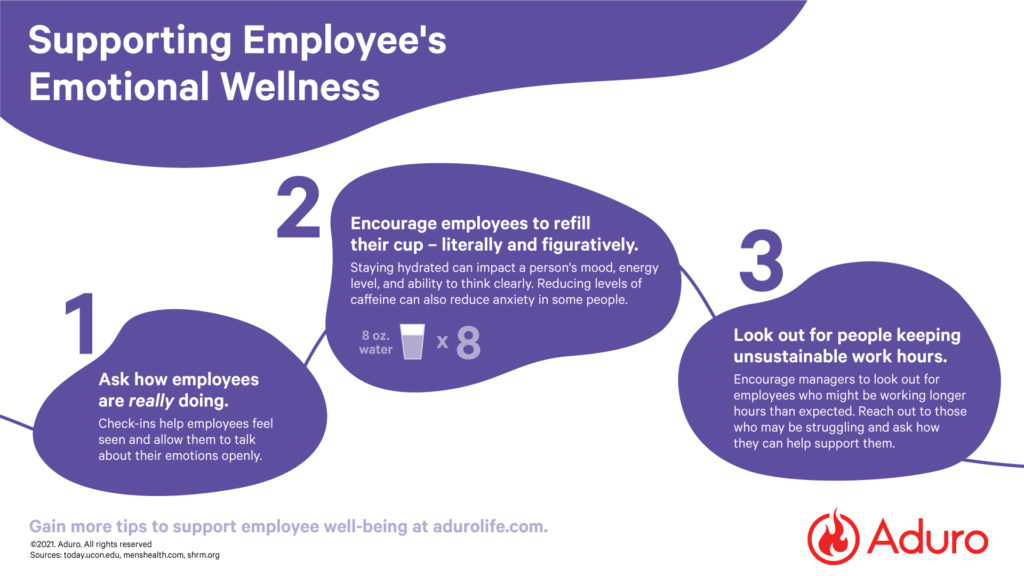Why Emotional Well-being at Work Matters More Now Than Ever
50 million Americans are impacted by mental health conditions — and even more struggle with challenges that impact their emotional wellness at work. According to Mental Health America’s Mind the Workplace 2021 Report, nearly 83% of respondents felt emotionally drained from their work.
The COVID-19 pandemic and the ensuing economic downturn have significantly impacted many people’s mental health and created new obstacles for those who already suffer from mental health challenges. Approximately 4 in 10 adults in the United States experienced anxiety or depressive disorder symptoms during the pandemic.
Our mental health includes our emotional, psychological and social well-being, according to the U.S. Department of Health & Human Services. It impacts how we think, feel, and act in and out of work.
Right now, many of us are still battling to cope with our emotional wellness in the workplace. One day we feel optimistic like we’re making the best of things. The next, we might feel angry by fear of the unknown or lethargic from the mundane day-to-day.
Here’s why emotions are running so high right now and how employers can help improve emotional wellness at work:
Employees are feeling overwhelmed by the double-shift of managing their work and home lives simultaneously.
Any built-in boundaries that may have existed between work and home are now non-existent for many remote workers and have taken its toll on employees’ emotional well-being at work.
Remote worker statistics show that more than 4.7 million people in the United States work remotely at least half the time. While 16% worldwide are entirely remote.
The blurred boundaries have some adverse effects; according to a survey, 65% of remote workers said they worked more hours than they did in the office. One of the main reasons may be that your employees might be juggling kids, aging parents, or the high-spirited new puppy they just adopted from a local shelter. These situations have affected emotional wellness at work. Before, these responsibilities may have felt like a second shift after work, but now, employees are performing a double shift, which is emotionally and physically exhausting.

How Employers Can Help:
- Start off the conversation by asking how they’re doing — how they’re really doing. Checking in with people makes them feel seen. It also helps them to feel like they can talk about their emotions openly, without feeling like they have to mask them. When supporting emotional wellness at work, leaders need to make them feel comfortable telling you how they feel. Remember that psychological safety comes first to communicate openly and honestly with employees.
- Encourage employees to take breaks to refill their cup — literally and figuratively. Did you know that even mild dehydration can impact a person’s mood, energy level, and ability to think clearly? Fostering emotional wellness at work can start by simply reminding employees to stay hydrated and drink eight 8-ounce glasses of water daily. Additionally, coffee may be our morning go-to, but be careful not to overdo it. Studies show that more than 250 milligrams of caffeine (the amount in roughly 2.5 cups of coffee) may cause anxiety in some people.
- Look out for people keeping unsustainable work hours. Without a doubt, people are going to need flexibility right now. The Society of Human Resource Management (SHRM) suggests staying on top of employee productivity right now — but not for the reasons you might think. It’s not about the company’s success but about emotional wellness at work. If someone is firing off emails at 2 a.m. and then showing up for an 8:30 a.m. meeting, they’re likely not getting adequate sleep, which can impact their emotional state and work performance.
Long working hours have been linked to an increased risk of cardiovascular illness, stress, and chronic fatigue. Encourage managers to put people first, look out for employees who might be struggling, and ask how they can help support them.
- Train managers to spot signs of domestic violence. Several cities saw an increase in domestic violence cases or calls to local hotlines since COVID-19, CNN reported. Some of the signs include constantly being worried about making their partner angry, unexplained marks or injuries, they seem depressed or anxious or you notice a sudden change in their personality. You might consider sharing the National Domestic Violence Hotline companywide: 1-800-799-SAFE (7233).
Employees are feeling anxious about their job security.
According to the Marketplace-Edison Research Poll, more than half of Americans are concerned about losing their jobs in the next 12 months. And living in fear of losing one’s job, especially when there are so many other reasons to be anxious, can have a significant mental and emotional impact.
How Employers Can Help:
- Be honest about what you know and what you don’t know. We can’t predict the future. We can, however, be transparent and honest with the information we do have, which earns employee trust and is a good foundation for emotional wellness at work.
- Share mindfulness exercises with your team. Mindfulness techniques — including deep breathing — encourage us to live in the present moment, which can help calm anxieties about the future. Don’t have the budget for employee mindfulness resources right now? We’ve got you. We have a free breathing meditation from Aduro’s Coach Jenn.
- Connect your employees with mental health resources. Reminding them of the benefits your company offers right now can help them manage their anxiety and fear of the unknown. Letting them know that you have emotional wellness programs in place will make them feel heard and supported. Maybe that includes therapy, coaching, meditation, or yoga. These practices can all help them focus on the things that are within their control rather than spending their already depleted time and energy on the things that aren’t.
Employees are feeling lonely.
We’re wired for companionship, as neuroscientist John Cacioppo pointed out. Unfortunately, loneliness in the American workforce has increased by 7% compared to pre-pandemic levels — 72% of workers reported feeling lonely at least monthly, and 55% reported feeling lonely at least weekly.
How Employers Can Help:
- Schedule a virtual bi-weekly meet-up with team members. Video chats can start to feel a little monotonous, especially if your employees use them to meet all day long. Break things up by letting the group pick an activity to do during the next team meeting. Maybe it’s something as simple as attending one of Mo Willems’ “Lunch Doodles” sessions, where he teaches kids and adults to draw some of the characters from his children’s books. Anyone can do it, it gets your mind off of the stresses of life, and it will very likely result in a few good laughs.
- Support a local nonprofit virtually. When you lift someone else’s spirits, you tend to feel lighter as well. Consider having each team at your company select a local nonprofit they’d like to help support virtually. It might be a virtual diaper drive to help babies living in poverty or crisis right now. You could make it a competition amongst all the groups to see who can donate the most diapers. Or each of your team members could record a virtual story time, which later gets shared with a young child facing homelessness.
- Get moving in virtual groups. Online training programs are an excellent method to boost motivation, stick to a regimen, and achieve your fitness goals. Exercise, in virtually any form, can be used to relieve stress. Being physically active can increase your feel-good endorphins and divert you from daily stresses. As a result, having an online workout program has various advantages, such as a range of live and on-demand classes, progress tracking, and recommendations for improvement or goal setting. Furthermore, social support can assist boost your enthusiasm to exercise and urge you to persevere with your new fitness regimen.
Supporting emotional well-being at work is one way to show employees that you care about them as people. That support can help get them through this difficult time — and it’s something they’ll remember long after it’s over.


